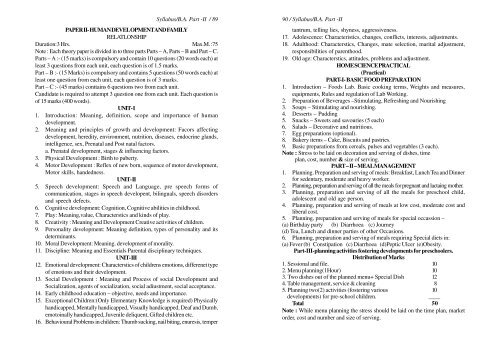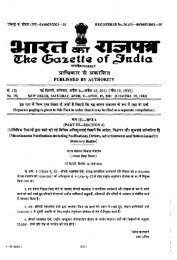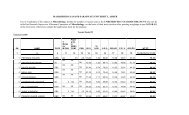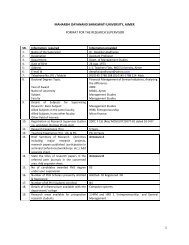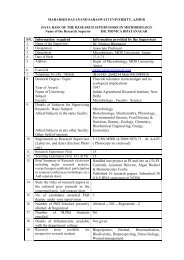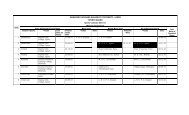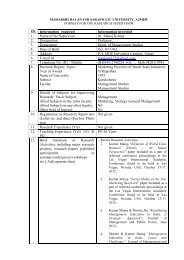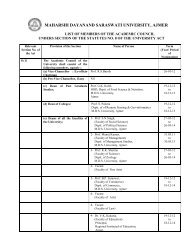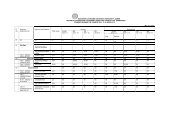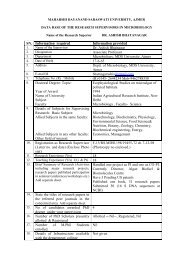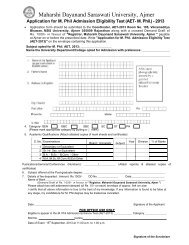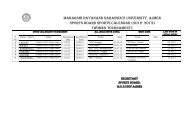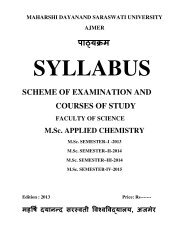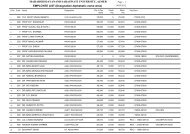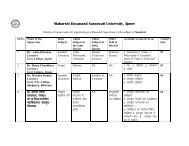ba pt II - Maharshi Dayanand Saraswati University, Ajmer, Rajasthan
ba pt II - Maharshi Dayanand Saraswati University, Ajmer, Rajasthan
ba pt II - Maharshi Dayanand Saraswati University, Ajmer, Rajasthan
Create successful ePaper yourself
Turn your PDF publications into a flip-book with our unique Google optimized e-Paper software.
PAPER <strong>II</strong>- HUMAN DEVEL OPMENT AND FAMILY<br />
RELATLONSHIP<br />
Duration:3 Hrs. Max.M. :75<br />
Note : Each theory paper is divided in to three parts Parts – A, Parts – B and Part – C.<br />
Parts – A :- (15 marks) is compulsory and contain 10 questions (20 words each) at<br />
least 3 questions from each unit, each question is of 1.5 marks.<br />
Part – B :- (15 Marks) is compulsory and contains 5 questions (50 words each) at<br />
least one question from each unit, each question is of 3 marks.<br />
Part – C :- (45 marks) conttains 6 questions two from each unit.<br />
Candidate is required to attem<strong>pt</strong> 3 question one from each unit. Each question is<br />
of 15 marks (400 words).<br />
UNIT- I<br />
1. Introduction: Meaning, definition, scope and importance of human<br />
development.<br />
2. Meaning and principles of growth and development: Facors affecting<br />
development, heredity, environment, nutrition, diseases, endocrine glands,<br />
intelligence, sex, Prenatal and Post natal factors.<br />
a. Prenatal development, stages & influencing factors.<br />
3. Physical Development : Birth to puberty.<br />
4. Motor Development : Reflex of new born, sequence of motor development,<br />
Motor skills, handedness.<br />
UNIT- <strong>II</strong><br />
5. Speech development: Speech and Language, pre speech forms of<br />
communication, stages in speech developent, bilinguals, speech disorders<br />
and speech defects.<br />
6. Cognitive development: Cognition, Cognitive abilities in childhood.<br />
7. Play: Meaning,value, Characterstics and kinds of play.<br />
8. Creativity : Meaning and Development Creative activities of children.<br />
9. Personality development: Meaning definition, types of personality and its<br />
determinants.<br />
10. Moral Development: Meaning. development of morality.<br />
11. Discipline: Meaning and Essentials Parental disciplinary techniques.<br />
UNIT- <strong>II</strong>I<br />
12. Emotional development: Characterstics of childrens emotions, differenet type<br />
of emotions and their development.<br />
13. Social Development : Meaning and Process of social Development and<br />
Socialization, agents of socialization, social adiustment, social acce<strong>pt</strong>ance.<br />
14. Early childhood education – objective, needs and importance.<br />
15. Exce<strong>pt</strong>ional Children:(Only Elementary Knowledge is required) Physically<br />
handicapped, Mentally handicapped, Visually handicapped, Deaf and Dumb,<br />
emotoinally handicapped, Juvenile deliquent, Gifted children etc.<br />
16. Behavioural Problems in children: Thumb sucking, nail biting, enuresis, temper<br />
Syllabus/B.A. Part -<strong>II</strong> / 89 90 / Syllabus/B.A. Part -<strong>II</strong><br />
tantrum, telling lies, shyness, aggressiveness.<br />
17. Adolescence: Characteristics, changes, conflicts, interests, adjustments.<br />
18. Adulthood: Characterstics, Changes, mate selection, marital adjustment,<br />
responsibilities of parenthood.<br />
19. Old age: Characterstics, attitudes, problems and adjustment.<br />
HOME SCIENCE PRACTICAL<br />
(Practical)<br />
PART-I- BASIC FOOD PREPARATION<br />
1. Introduction – Foods Lab. Basic cooking terms, Weights and measures,<br />
equipments, Rules and regulation of Lab Working.<br />
2. Preparation of Beverages –Stimulating, Refreshing and Nourishing<br />
3. Soups – Stimulating and nourishing.<br />
4. Desserts – Pudding<br />
5. Snacks – Sweets and savouries (5 each)<br />
6. Salads – Decorative and nutritious.<br />
7. Egg preparations (o<strong>pt</strong>ional).<br />
8. Bakery items – Cake, Biscuits and pastries.<br />
9. Basic preparations from cereals, pulses and vegetables (3 each).<br />
Note : Stress to be laid on decoration and serving of dishes, time<br />
plan, cost, number & size of serving.<br />
PART – <strong>II</strong> – MEAL MANAGEMENT<br />
1. Planning. Preparation and serving of meals: Breakfast, Lunch Tea and Dinner<br />
for sedentary, moderate and heavy worker.<br />
2. Planning, preparation and serving of all the meals for pregnant and lactaing mother.<br />
3. Planning, preparation and serving of all the meals for preschool child,<br />
adolescent and old age person.<br />
4. Planning, preparation and serving of meals at low cost, moderate cost and<br />
liberal cost.<br />
5. Planning, preparation and serving of meals for special occassion –<br />
(a) Birthday party (b) Diarrhoea (c) Journey<br />
(d) Tea, Lunch and dinner parties of other Occasions.<br />
6. Planning, preparation and serving of meals requiring Special diets in:<br />
(a) Fever (b) Constipation (c) Diarrhoea (d)Pe<strong>pt</strong>ic Ulcer (e)Obesity.<br />
Part-<strong>II</strong>I-planning activities fostering developments for preschoolers.<br />
Distribution of Marks<br />
1. Sessional and file. 10<br />
2. Menu planning(1Hour) 10<br />
3. Two dishes out of the planned menu+ Special Dish 12<br />
4. Table management, service & cleaning 8<br />
5. Planning two(2) activities (fostering various 10<br />
developments) for pre-school children. ____<br />
Total 50<br />
Note : While menu planning the stress should be laid on the time plan, market<br />
order, cost and number and size of serving.


